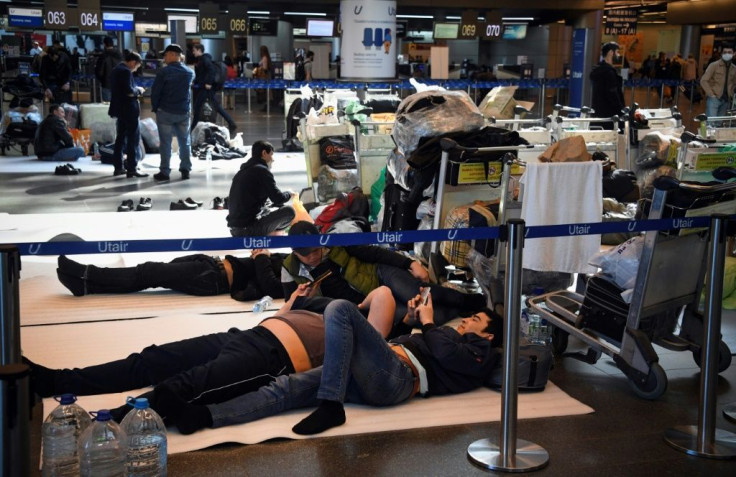Sealed Borders Leave Migrants Stranded In Moscow's Airports
For the past six days, Ayomuddin Kamolov has slept on the tiled floor of a Moscow airport, hoping to get a flight to his native Tajikistan.
He is one of hundreds of Central Asian migrant workers stranded in the Russian capital's airports after borders were sealed and flights grounded to contain the coronavirus pandemic.
"My flight was cancelled and the company promised me a hotel. But in the end I got nothing," Kamolov told AFP in a busy terminal at Vnukovo, one of the three main airports serving Moscow.

Despite overcrowding and poor hygienic conditions, none of those waiting for up to several days had received disinfectant gel or surgical masks to protect against COVID-19, the 29-year-old said.
No medical checks were carried out either, he added.
Hundreds of thousands of men and women from ex-Soviet republics in Central Asia live in Russia where they often work low paid jobs to escape unemployment and feed families back home.

But hundreds are stranded after Uzbekistan and Tajikistan grounded nearly all incoming flights as part of dramatic measures to limit the spread of the coronavirus.
On Tuesday, 100 Tajik citizens at Vnukovo were stretched out on foam mats between baggage carts loaded with plastic-wrapped suitcases and crates of bottled water.
Return flights were leaving sporadically and the price of some seats had nearly tripled. Trains from Russia to Central Asian countries have been suspended too.

"We are waiting for the nightmare to end," said Sakhib Narzullaev, a 21-year-old student hoping to return to the capital of Tajikistan, Dushanbe.
Over the four days he has been waiting, he helped distribute food and water among the other hopeful passengers, he told AFP.
Beyond a row of check-in counters, 50 people were waiting for a flight to Uzbekistan.

One of them, 21-year-old Ikbol who works for a food delivery service in Moscow, had been at Vnukovo for six days.
"I decided to come back because restaurants are closing and I had fewer and fewer orders. Also my parents are worried about me because of the virus," he said, speaking through a mask.
Ikbol said that he will have to sit through a compulsory two-week quarantine on arrival, a precaution authorities both Uzbekistan and Tajikistan have imposed.
Adding to the congestion at Moscow's airports, the travel restrictions have coincided with spring celebrations in Central Asia when many migrant workers return home after labouring through the winter.
Similar scenes have reportedly played out in Ekaterinburg in the Urals, where hundreds of Kyrgz citizens were stranded, and at an airport in Siberia's Novosibirsk in Siberia.
Russia's civil aviation authority, Rosaviatsiya, blamed the bottleneck on countries that cut the flights and said that "steps are being taken" to resolve the issue.
To prevent those stranded from overstaying expiring visas, the Russian authorities announced on March 19 they would extend stays for foreigners and not impose fines or penalties.
But the mass return of migrant workers from Russia poses a threat to economies in Central Asia reliant on money transfers from family working abroad.
Ikbol, the courier from Uzbekistan, said he had not been paid his most recent salary and was worried he wouldn't be paid at all.
"Here in Russia, factories are starting to close and we don't know how long it will last," Kamolov said.
"What are we going to do if we can no longer feed our families?"
© Copyright AFP 2024. All rights reserved.











